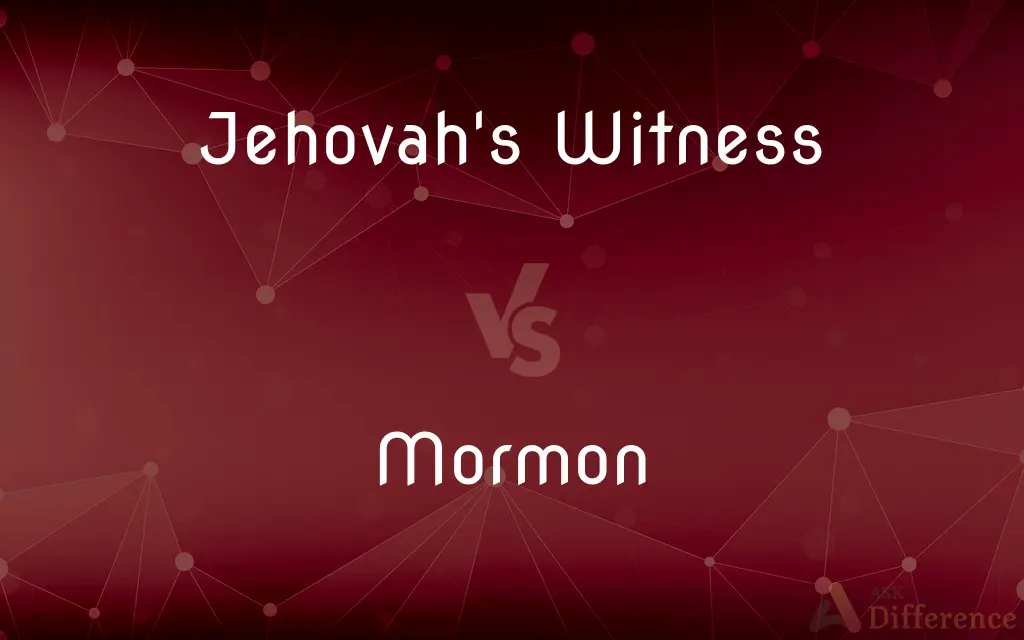Jehovah's Witness vs. Mormon — What's the Difference?
By Tayyaba Rehman — Published on January 20, 2024
Jehovah's Witnesses are members of a Christian denomination known for their door-to-door evangelism and unique beliefs, while Mormons are members of the Church of Jesus Christ of Latter-day Saints, known for their distinct scriptures and practices.

Difference Between Jehovah's Witness and Mormon
Table of Contents
ADVERTISEMENT
Key Differences
Jehovah's Witnesses, originating in the late 19th century, focus on the teachings of Charles Taze Russell and later leaders, emphasizing the imminent end of the world and the importance of door-to-door evangelism. Mormons, founded by Joseph Smith in the early 19th century, believe in the Book of Mormon as another testament of Jesus Christ, in addition to the Bible.
Jehovah's Witnesses reject the Trinity doctrine, believing in Jehovah as the singular God and Jesus as a separate creation. Mormons accept the idea of a Godhead comprising three distinct beings united in purpose, viewing God the Father, Jesus Christ, and the Holy Ghost as separate entities.
Jehovah's Witnesses are known for their refusal of blood transfusions, celebration of holidays, and military service, based on their interpretations of the Bible. Mormons are known for practices such as baptism for the dead, temple worship, and a strong emphasis on family and missionary work.
Jehovah's Witnesses use their own translation of the Bible, the New World Translation, and focus on distributing their literature globally. Mormons use the King James Version of the Bible (or other versions in non-English-speaking countries) along with the Book of Mormon, Doctrine and Covenants, and Pearl of Great Price as their scriptures.
Comparison Chart
Founding
Late 19th century
Early 19th century
ADVERTISEMENT
Key Beliefs
Imminent end of the world, no Trinity
Godhead of three beings, Book of Mormon
Unique Practices
No blood transfusions, no holidays
Baptism for the dead, temple worship
Scriptures
New World Translation of the Bible
Bible, Book of Mormon, Doctrine and Covenants
Evangelism and Outreach
Door-to-door evangelism
Structured missionary program
Compare with Definitions
Jehovah's Witness
Emphasize the imminent end of the world.
Jehovah's Witnesses preach about the impending Armageddon.
Mormon
Practice baptism for the dead and temple worship.
Temple rituals are significant religious practices for Mormons.
Jehovah's Witness
Reject traditional Christian doctrines like the Trinity.
Jehovah's Witnesses believe in Jehovah as the only true God.
Mormon
Emphasize family and community in their teachings.
Family history and genealogy are important to Mormons.
Jehovah's Witness
Do not participate in holidays or military service.
Jehovah's Witnesses are known for not celebrating Christmas.
Mormon
Engage in a structured missionary program.
Many young Mormons serve as missionaries for two years.
Jehovah's Witness
Known for their unique interpretation of the Bible.
Jehovah's Witnesses use the New World Translation of the Bible.
Mormon
Members of the Church of Jesus Christ of Latter-day Saints.
Mormons follow the teachings of Joseph Smith.
Jehovah's Witness
Members of a Christian denomination emphasizing evangelism.
Jehovah's Witnesses often engage in door-to-door preaching.
Mormon
An ancient prophet believed to have compiled a sacred history of the Americas, which was translated and published by Joseph Smith as the Book of Mormon in 1830.
Mormon
A member of the Mormon Church. Also called Latter-day Saint.
Mormon
Of or relating to the Mormons, their religion, or the Mormon Church.
Mormon
Any of various dark-coloured Asian species of papilionid butterflies of the genus Papilio.
Mormon
A genus of sea birds, having a large, thick bill; the puffin.
Mormon
One of a Christian denomination (The Church of Jesus Christ of Latter-day Saints) in the United States, followers of Joseph Smith, who professed to have found an addition to the Bible, engraved on golden plates, called the Book of Mormon, first published in 1830. The Mormons believe in polygamy, and their hierarchy of apostles, etc., has control of civil and religious matters.
Mormon
A member of a sect, called the Reorganized Church of Jesus of Latterday Saints, which has always rejected polygamy. It was organized in 1852, and is represented in about forty States and Territories of the United States.
Mormon
Of or pertaining to the Mormons; as, the Mormon religion; Mormon practices.
Mormon
A member of the Mormon Church
Mormon
Of or pertaining to or characteristic of the Mormon church;
Mormon leaders
The former Mormon practice of polygamy
Mormon
Believe in the Bible and the Book of Mormon.
The Book of Mormon is a central scripture for Mormons.
Common Curiosities
Do Mormons believe in the concept of heaven and hell?
Mormons believe in different degrees of glory in the afterlife, rather than the traditional heaven and hell.
How do Jehovah's Witnesses view Jesus?
Jehovah's Witnesses view Jesus as God's son but not part of a Trinity.
Do Jehovah's Witnesses celebrate birthdays?
No, Jehovah's Witnesses do not celebrate birthdays or most other holidays.
Can Mormons drink coffee or tea?
Mormons typically abstain from coffee and tea based on their health code, the Word of Wisdom.
Are Jehovah's Witnesses Christian?
Yes, they identify as Christians but have distinct beliefs from mainstream Christianity.
What is the Mormon stance on polygamy?
The mainstream Mormon church (LDS Church) banned polygamy in the late 19th century.
Can Mormons use birth control?
Birth control decisions are generally left to individual Mormon couples.
Can Jehovah's Witnesses accept medical treatments?
Yes, except for blood transfusions, which they refuse on religious grounds.
Do Jehovah's Witnesses have a central church leadership?
Yes, they are governed by the Watch Tower Bible and Tract Society.
Do Mormons practice tithing?
Yes, tithing is an important practice in Mormonism.
Do Jehovah's Witnesses believe in hell?
They do not believe in hell as a place of eternal torment.
How do Jehovah's Witnesses view the end of the world?
They believe in Armageddon, a final battle between good and evil.
Are Jehovah's Witnesses allowed to vote?
Jehovah's Witnesses typically avoid political involvement, including voting.
Are Mormons Christians?
Mormons consider themselves Christians but have additional scriptures and beliefs.
What is the significance of temples for Mormons?
Temples are considered sacred spaces for special ordinances in Mormonism.
Share Your Discovery

Previous Comparison
Hilton vs. Holiday Inn
Next Comparison
Pentium vs. Core 2 DuoAuthor Spotlight
Written by
Tayyaba RehmanTayyaba Rehman is a distinguished writer, currently serving as a primary contributor to askdifference.com. As a researcher in semantics and etymology, Tayyaba's passion for the complexity of languages and their distinctions has found a perfect home on the platform. Tayyaba delves into the intricacies of language, distinguishing between commonly confused words and phrases, thereby providing clarity for readers worldwide.












































